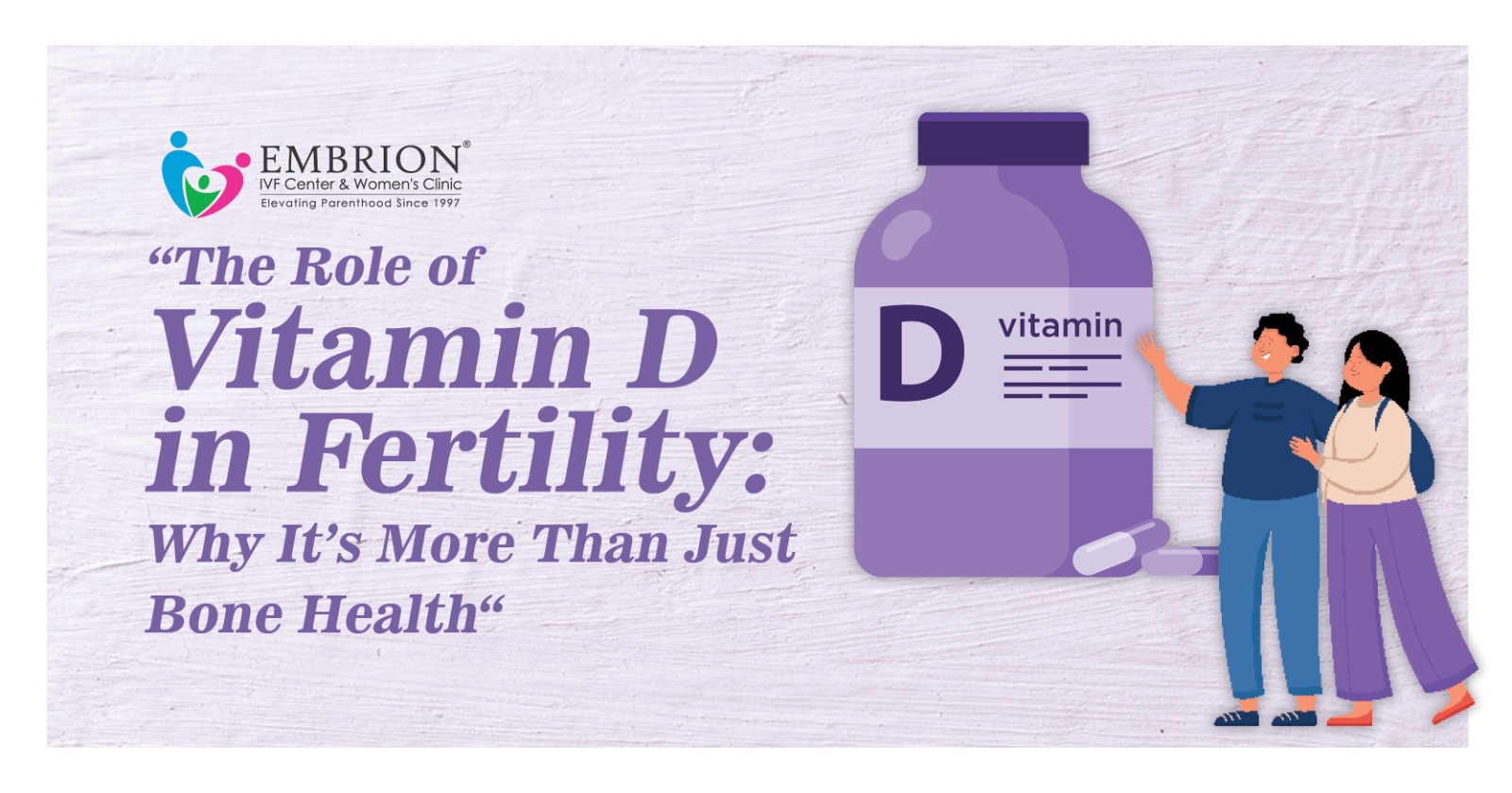- The Role of Vitamin D in Fertility: Why It's More Than Just Bone Health
- 1. Vitamin D Regulates Hormones Important for Fertility
- 2. Vitamin D Improves Egg Quality and Embryo Development
- 3. Vitamin D and IVF Success
- 4. How to Ensure Adequate Vitamin D Levels
- Conclusion: Vitamin D is Vital for Fertility Health
Did you know that vitamin D, often associated with strong bones, plays a crucial role in fertility? While most people are aware of its benefits for bone health, many don’t realize that this essential nutrient is also vital for reproductive health, from hormone regulation to improving egg quality. Whether you're looking to conceive or just maintaining reproductive health, ensuring adequate levels of vitamin D can make a significant difference.

If you're considering Fertility Treatment in Ahmedabad, Embrion IVF Clinic offers expert guidance. Read this blog by our experts on the Role of Vitamin D in Fertility. Know why ensuring adequate levels is important for anyone trying to conceive.
Hormones are at the core of reproductive health. There is a significant role of Vitamin D in fertility enhancement as it maintains hormone balance. Key hormones like estrogen and progesterone are essential for ovulation, preparing the uterus for implantation, and sustaining pregnancy.
● Estrogen and Progesterone Regulation : Vitamin D helps regulate the production of estrogen and progesterone, the primary female sex hormones that influence fertility. Estrogen supports the development of eggs and the thickening of the uterine lining, while progesterone is vital for maintaining a healthy pregnancy once conception occurs. An imbalance in these hormones can lead to issues like irregular periods, anovulation (lack of ovulation), and difficulty sustaining a pregnancy.
Maintaining adequate vitamin D levels can help ensure that these hormones are properly regulated, which in turn supports a regular menstrual cycle and successful conception.
Egg quality is one of the key factors and so is the role of Vitamin D in fertility. As women age, the quality of their eggs tends to decline, which can make it more difficult to conceive. However, recent studies suggest that vitamin D may have a positive impact on egg quality, especially for women undergoing fertility treatments like in vitro fertilization (IVF).
● Studies and Findings : Research has shown that women with higher levels of vitamin D tend to have better egg quality. One study found that vitamin D might help improve the maturation of eggs and the development of embryos, which is particularly important for those undergoing IVF or other assisted reproductive technologies.
● Fertility and Aging : As age impacts egg quality, ensuring adequate vitamin D intake may help reduce age-related declines in fertility. Improving the quality of the eggs and vitamin D may offer women a better chance of achieving a healthy pregnancy.
For couples undergoing IVF, the importance of vitamin D cannot be overstated. We will tell how the role of Vitamin D in Fertility has an impact on success of IVF. Adequate levels of vitamin D have been linked to improved outcomes for those seeking assisted reproductive technologies.
● Impact on IVF Success Rates : Research has indicated that women with optimal vitamin D levels are more likely to experience successful IVF outcomes, including higher fertilization rates and embryo quality. Low vitamin D levels have been associated with lower pregnancy rates following IVF.
● Implantation and Pregnancy : Vitamin D may also influence implantation, the process by which a fertilized embryo attaches to the uterine lining. Low levels of vitamin D may impair this process, making it harder for an embryo to implant and thrive.
Ensuring proper vitamin D levels could therefore improve the chances of IVF success, making it an essential nutrient for women undergoing fertility treatments.
Now that we know the role of vitamin D in fertility, it’s important to ensure you’re getting enough of it. Here are the best ways to boost your vitamin D levels :
● Sunlight : Vitamin D is known as the “sunshine vitamin” because your body produces it in response to sunlight. Spending time outdoors in the sun for about 15-20 minutes a day can help your body synthesize vitamin D. However, factors like time of day, skin tone, and geographical location can impact how much vitamin D your body produces.
● Diet : Certain foods are rich in vitamin D. Fatty fish such as salmon, mackerel, and sardines, along with fortified foods like milk, cereal, and orange juice, are excellent sources of vitamin D. Egg yolks and beef liver also contain small amounts of the nutrient.
● Supplements : If you’re not getting enough vitamin D from sunlight or food, supplements can help. Vitamin D3 is the most effective form of supplementation. As you’ve read about Vitamin D in fertility, remember that, before starting any supplement regimen, consult with your doctor to determine the right dosage based on your individual needs.
● Testing : Since many people have low levels of vitamin D without realizing it, it’s a good idea to ask your doctor about testing your vitamin D levels. A simple blood test can determine whether your levels are within the optimal range, so you can take the necessary steps to improve them if needed.
The importance of Vitamin D in fertility health is major. Vitamin D is an essential nutrient that plays a critical role in regulating hormones, improving egg quality, and supporting IVF success. Ensuring you have sufficient vitamin D levels can improve your reproductive health and increase your chances of conceiving. Whether it’s through sunlight, food, or supplements, it’s important to take steps to ensure you’re getting enough of this vital nutrient.
Remember, every fertility journey is unique, and it’s always a good idea to speak to your doctor about your specific needs and concerns. A simple vitamin D test could be a key step in optimizing your fertility and improving your chances of a successful pregnancy. For a consultation with an expert, visit Embrion IVF Clinic and talk to our fertility specialist!